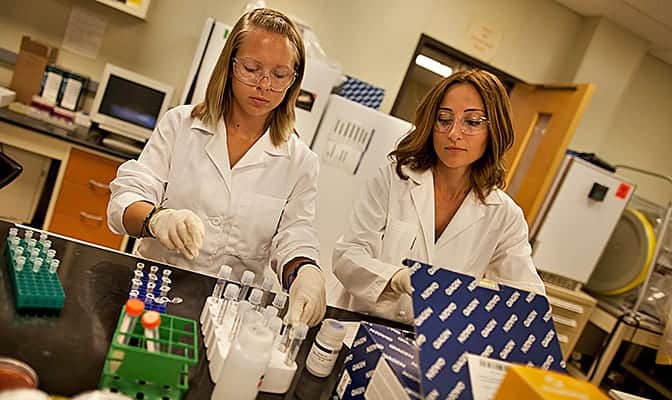Work in Faculty Labs
For pay, credit or as a volunteer
There are many opportunities to work in faculty research labs for pay, academic credit, or as a volunteer. If you want to do this you would elect ChE 290 (sophomores, free elective credit) or ChE 490 (Directed Study, Research and Special Problems, technical elective credit) after making arrangements with a professor to work on a specific project. Projects are available in Fall, Winter, Spring or Summer Terms. If you are looking for a lab job for the summer you should ideally start your search in February.

To find a research position in the Chemical Engineering department:
Explore options by visiting the department research page and the list of available ChE 490 projects. Note that a number of professors have projects available that aren’t on this list.
Contact the professor to see if you can get a position working in their labs. When e-mailing professors, remember that enthusiasm and interest in their area count for a lot. In the email, include:
- Why you are interested in working in their labs. Cite the web page, how it relates to your interest, etc.
- Why you are a good candidate—List relevant experience, your major, resume highlights. “As you can see from my resume…” sentences work well.
- Your resume, as an attachment.
- Whether you are interested in a paid position or academic credit, and whether you’re willing to consider a volunteer position.
- Your availability to meet with them in the near future to discuss the position.
If you both agree to arrangements for a research project, you can make arrangements to get paid or sign up for that professor’s section of ChE 290 or ChE 490. A student enrolled in ChE 290 or ChE 490 for 3 credits will be expected to:
- Work 12 hours per week (during Fall and Winter terms); 24 hours per week would be required for Spring and Summer 1/2 terms) on the project. This comes to 4 hours per week per credit hour if working a full term, or if working only part of the term, use 60 hours total of work per credit hour to determine total credit hours to sign up for.
- Submit a carefully crafted and thoughtfully organized written report at the end of the semester.
- Present a 10 minute oral report near the end of the semester, generally to the professor’s research group.
First-year or sophomore students who have not yet completed ChE 330 and 341 should sign up for ChE 290 credit, which counts for general electives. Students who have completed ChE 330 and 341, or a semester of ChE 290 research, are eligible to sign up for ChE 490, which can be used toward the 3-credit Engineering Elective requirement.